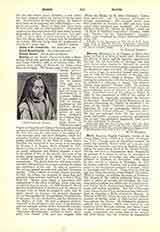

Blosius (or DE BLOIS), FRANCOIS-LOUIS, a Benedictine abbot and spiritual writer, b. at Donstienne, near Liege, Flanders, 1506; d. at Liessies, 1566. His parents were nobles of Hainault, his father being Sieur of Jumigny. He became page to the Archduke Charles (afterwards Emperor Charles V) but entered the Abbey of Liessies when only fourteen. Whilst still a novice he was sent to study at the University of Louvain, whence he was recalled in 1527 to become coadjutor to the Abbot, Gilles Gippus, his nomination as suchbeing confirmed by a Bull of Pope Paul III. Three years later, in 1530, he succeeded Gippus as thirty-fourth Abbot of Liessies, and received ordination and the abbatial blessing in the same year. His first care was the cultivation in his abbey of a true monastic spirit and strict discipline, which had somewhat declined under his predecessors. He hadhardly settled down to the work of reform before Flanders was immersed in war owing to its invasion by Francis I of France, which occurred in 1537. Liessies, being on the frontier, became in consequence an unsafe habitation and Blosius proposed a moveto the priory of Ath, in the interior, but most of his monks, being opposed to his reform, either elected to remain at Liessies or else went to other laxer monasteries. The abbot, however, with three monks, retired to Ath and there he at once restored the primitive observance of the rule. In spite of opposition the reform gained ground and numbers increased rapidly. When a return to Liessies became possible, in 1545, the reform was accepted by those that had remained there and was confirmed by a Bull of Pope Paul III. Blosius next began a restoration and enlargement of the abbey buildings, which were only completed after his death. In 1556 Charles V offered him the Archbishopric of Cambrai and the abbacy of Tournai, both of which he refused in order that he might remain at Liessies. In personal character he was distinguished for his gentleness, his generosity to the poor, his love of chastity, and his devotion to the Mother of God. He was a diligent student, especially of the Scriptures, the works of the Fathers, and the mystical writers of the fourteenth century. His own writings were numerous, the chief being “Speculum Monachorum”, written in Latin, translated into French 1726, and into English 1872 (Mirror for Monks, by Sir John Coleridge), “Entretiens spirituels”, and “Instructions spirituelles et pensees consolantes”. His complete works were first published at Louvain in 1568 and have been many times reprinted and translated. Of English editions, besides the “Mirror for Monks”, there are “A Book of Spiritual Instruction” (London, 1900) and “Comfort for the Faint-hearted” (London, 1902), both translated by Father Bertrand Wilberforce, O.P.
G. CYPRIAN ALSTON

